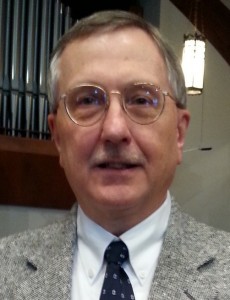 With this issue, CMI inaugurates a column that will help readers become acquainted with the work of the many talented composers who are among its members. It is with pleasure that CMI introduces to its members one our own – William Allen Pasch (“Bill”).
With this issue, CMI inaugurates a column that will help readers become acquainted with the work of the many talented composers who are among its members. It is with pleasure that CMI introduces to its members one our own – William Allen Pasch (“Bill”).
CMI: Would you speak to your interest in music and how it developed?
WAP: Music goes back as far as I can remember into my very earliest years, in everyday songs sung by my parents, gift classical LP records from cousins, grade-school piano lessons, and church youth choirs. Organ study began not too very long before I became organist at age 13 my home Lutheran church in Toledo, Ohio. High school music added band and orchestra (trombone) and guitar in a folk-singing quartet with friends (such music being the rage in the early 1960’s). Although not a music major in college I still continued organ lessons and sang in the college’s top choir. Majoring in English and pursuing graduate study in the discipline, I continued in musical activity wherever I could, finding particularly rich inspiration and growth in the remarkable music program at Immanuel Lutheran Church in Amherst, Massachusetts—an inspiration that continues even forty years later in my frequent anthem collaboration with Robert Weaver, who is still the mainstay of the tenor section in that Amherst choir. But also in graduate school I realized the complementarity and mutual reinforcement of my interests in language and in music. I came fully to appreciate the music inherent in language and the stimulating challenge of finding the best possible “fit” between the best verbal texts and the best music. My work in church music has been motivated by this ideal ever since.
CMI: Would you speak about your connection to the church? How did you come to
have a vocation in the church?
WAP: I’ve never felt truly apart from church music, again tracing to my church youth choir days. Even my high-school trombone-playing served the church, in the year-highlighting brass quartet on Easter Sunday. From high school forward, all my musical efforts were church-related in some form: organist positions, choir-singing and directing, serving on congregation worship/music committees (now including my ELCA-Southeastern Synod’s worship and music team), and eventually composing music for church use. So, like my lifelong learning in music, I have felt a steady, enduring “call” for over sixty years now both from and to the church to serve it as best I can through music.
CMI: How do you understand the place/role of music in worship?
WAP: Being Lutheran, I think of the saying attributed to Saint Augustine and seconded by the Augustinian Luther: “When we sing we pray twice.” Congregational singing in worship also requires the offering of one’s entire being in praise and reflection—not just “soul” but body, and in more ways than does mere verbal response. Anthems can also involve the congregation, so several of my anthems offer a concertato option. Above all, music can go where words often cannot. This fact is of the essence in both praise and prayer in musical form.
CMI: As a composer, what considerations inform your compositions for use in worship?
WAP: For someone with compositional aspirations that pre-dated the dawn of the computer age, nothing so informed my work in composition as the development of digital music-notation software. Digital notation software was not a gift unique to church music, of course, but nothing enables my work as a church musician better than the ability to experiment with format, hear playback, and see music (often with text) unfold on the “page” that computerized notation software so readily provides.
Less technically to the point, though, what most informs my church-music compositional sensibility is a desire to get the most from the least: settings can that can be sung to good effect both by small, limited choirs and by large, well-endowed ones. This leads me to seek or compose melodies sturdy enough that anthems built on those melodies can offer the option to be sung either in unison or in parts.
Another motivating factor in my composing for the church is a desire to play a positive, conciliatory role in the “culture wars” that often set “Traditional Church Music” and “Praise Music” in absolute opposition to each other. Interesting and deeply moving music can take a wide variety of forms, perhaps especially on the “Traditional” side. I hope that my small—but still, fortunately, growing—body of work is an example of such cultural variety, from spiritual-based bluesy rhythms to Appalachian roots to the sample composition offered here, the Collect for Grace.